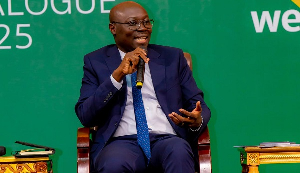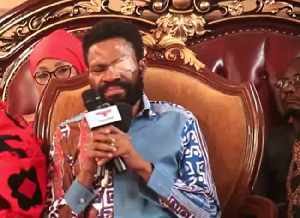Moesha Boduong. One Ghanaian woman. One minute four second interview on CNN. One international award winning journalist, Christiane Amanpour. One outraged and disgusted nation.
The woman condemned. The journalist lambasted.
Moesha contributed to a series called ‘Sex and Love: Around the World’. The series features the nations of Ghana, India, Germany and Japan. On CNN.com, the show is described as follows:-
‘CNN’s Christiane Amanpour travels the world covering global affairs but hadn’t explored the love lives of strangers – until now. Amanpour gets personal with women she meets in various corners of the globe by inquiring about their intimate lives. In the process, she shines a light or what sex and love look like around the world.’
Moesha Boduong is one of at least three Ghanaian women to be featured. She spoke of sleeping with married men in order to get her rent, car and bills paid. Other women include an Accra businesswoman who is one of three wives and discusses the issues there. The series also includes Amanpour talking with refugees on how they maintain love, intimacy and sex as they flee the horrors of war; the influence of religious sects on divorce for women in Lebanon and sexual violence for women in India.
In Ghana, Moesha has been shamed, abused, called names and held up as a national disgrace. Across all forms of media; radio, TV and social media, there were escalating levels of outrage.
Let’s pause. Let’s parse. And let’s connect some dots.
This one minute interview opens a specific door to explore some lived realities; our nation’s attitude to women, our obsession with how global audiences – and by that I mean white people – see Ghana, as opposed to how Ghanaians see themselves; as well as hypocrisy and morality.
The economies contained within the interview were; affordable housing; women’s choices and a woman’s body as personal currency and pleasure by married men.
The reality is over-priced housing, an economy that disadvantages, discriminates and abuses women are not issues we care enough about.
Affordable housing is a major issue.
Ghanaians find themselves priced out of their own city due to greedy landlords demanding two years rent despite a legislation shift. A complete lack of urban planning in our metropolis also fails to cater to the housing needs of those who live here; unless they are wealthy.
But, we don’t really care about that.
The personal sexual economy that Moesha spoke of is one that millions of Ghanaian women face every day. They too engage their bodies as currency to deal with the multiple issues of navigating their particular challenges. These women are part of our informal sector which is dominated by women. 80% of Ghana’s economy is controlled by this sector. These women are in the world of retail, they are traders, they are market women, their work feeds and clothes millions. And some use their bodies as bridges to transport goods across borders; to move from one place to another due to the demands of men who regularly abuse their power.
But we don’t really care about them or that either.
Not as much as we care about how we look as a nation when Moesha explained that through sleeping with married men she affords her living expenses. Our outrage conveys that this – a grown, adult women’s choices – is the focus of our fury.
The lived realities of economies of women all across Ghana are ignored due to our national obsession with appearance in the presence of a global audience – and by that I mean white people. Essentially, we are saying that how white people see us matters much more than how we see ourselves or are seen by each other as Ghanaians. We know this because Moesha Boduong did a similar interview with the TV personality Delay and the result was not national outrage.
Some men’s outrage.
I was struck by the levels of anger from so many men.
Men argued, railed and condemned Moesha with such force.
I have not heard such anger from men about the economies women must endure, navigate, struggle and suffer in order to put food on tables, get children to school, keep a roof over heads. Evidence of that lack of care is how little we focus on the reality which requires women use their bodies as currency to bargain to complete a day’s work. These same men do not rush to mics to voice their anger at women in the informal sector daily navigating the multiple abuses of power by men.
I listened to commentary after commentary across media. It revealed when it comes to issues about women, journalistically we rarely reach for the fact of a lived experience. We do next to no research. Instead we lean heavily on outrage, judgment and shaming. We claim this is perspective and commentary. It is not. It is sexism masquerading as discussion.
I listened to men rain shame and abuse on the head of Moesha. They seemed to want her to cower and crumble under the withering moralizing that has occurred across media houses all over Ghana.
We are a nation where one woman can create a frenzy regarding our appearance as a nation in front of total strangers, but the reality of 14 year old girls being sexually harassed and abused by adult male teachers whose behaviour teaches girls their bodies can be exchanged for a letter on a paper or for unpaid school fees, does not ignite similar outrage. Indeed, if we connected dots, we could argue that Moesha represents an experience learned by 13 year old girls in the classrooms of Ghana at the hands of male, married teachers abusing their power and turning education into a cauldron to feed their criminal deviant sexual pleasure – like those in Ejisuman.
There is no national talk about the morality of these male teachers whose actions teach teenage girls to regard their bodies as currency, a thing of male pleasure, to be exchanged for education.
And in the ‘Sex and Love’ series, Amanpour spoke to a man in the Ghana interviews; Archbishop of the Action Chapel mega church. He said: “We don’t put women down in our society. We don’t do that.”
Really? Seriously.
Ghana doesn’t put women down in our society? The same Ghana where we shame and blame rape victims who dare to seek justice for the abuse of their bodies. The same Ghana where on Wednesday 18th April, a video circulated of multiple grown men flogging a defenseless teenage girl – around 13-14 years old – with fire hoses, their feet and a whip. The same Ghana where pastors routinely show up in the papers for abusing their Church, their congregants in all manner of ways. And the same Ghana where we stone women to death.
Our hypocrisy stinks more than chicken stew left in the sun and now rotting, the smell making you gag.
Veneer, appearance, surface – that is our representation politics.
Some women’s outrage.
Women spoke of representations of Ghanaian womanhood.
Some women’s outrage dismissed the issues Moesha spoke to while focusing squarely on the ‘type’ of woman she was; and that she didn’t represent them.
There were hard workers, those with education, pride, dignity. They were that ‘type’. Others spoke of a ‘Moesha’ ‘type’ of prostitution, cheapness, immorality and disgust.
The Minister of Gender weighed in too. Hon. Otiko Djaba issued a statement with the power of her office and Ministry. In her statement she also abused Moesha calling her ‘publicity hungry’ basking in ‘infamy and self-ridicule’. This is the same Minister who had to be pushed and critiqued to issue a statement on the rape of a 4 year old girl; and who told Ghana her role is not to police such cases – it is, it seems, to police the choices of grown women.
Ghana is a nation that measures its morality by what happens between the legs of women. Hide that, silence it, pretend about it, cover this reality with a wedding ring, kente, lipstick, a sensible hemline and Sunday Church and society will applaud you. Dare to reveal the truth of a Moesha’s reality and you will be swiftly condemned.
It was a week of mayhem, morality and utter hypocrisy.
Our expectation is that Christiane Amanpour would tell a story of Ghana that highlights married women without cheating husbands, all with model homes, working impeccably hard, upright and churchgoers all, plus the rise and rise of the economy. But, mostly our expectation is that Christiane Amanpour not sully the global network of CNN and represents Ghana with a woman like Moesha.
Our judgment is dripping from our chins.
The married men Moesha may engage with are never the target of the morality that we rain down on the Moeshas of our nation. No. Their dishonesty, the breaking of their vows, the hypocrisy of their judgment and outrage is no target for our national fury. No. Married men are not carriers of morality in Ghana. And so they escape, unscathed, off to pick up the keys to an apartment which they will hand over to their side-chicks, before returning to a wife and kids, opening their Bibles to do Morning Devotion as they stroll into Church on Sunday, epitomizing the successful upright family man.
Instead of targeting the individual and her story, what if we confronted and dealt with the issues?
Moesha is one woman articulating the story of her lived experience. The issues are about treatment of women and what we endure, our refusal as a nation to reckon with and speak about the hypocrisies in the behaviour of married men and our belief that representation on global stages matters more than representation on our own national stage.
For me this is not about the story, it is about the issues.
What is about for you?
Opinions of Thursday, 19 April 2018
Columnist: Esther A. Armah



![New IGP, COP Christian Tetteh Yohonu [L] and immediate-past IGP, Dr. Akuffo Dampare New IGP, COP Christian Tetteh Yohonu [L] and immediate-past IGP, Dr. Akuffo Dampare](https://cdn.ghanaweb.com/imagelib/pics/140/14041582.295.jpg)











